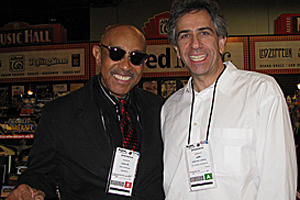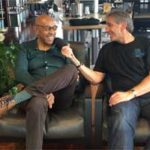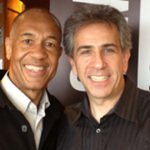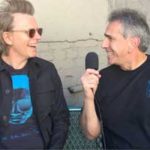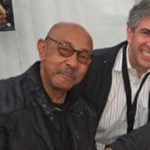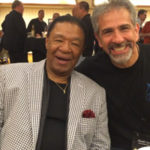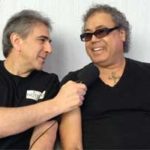Bass legend imparts first-hand wisdom from his mentor Horace Silver, plus current projects, equipment and more!
Exclusive interview with FBPO’s Jon Liebman
August 3, 2014
A native of the Bronx, New York, John B. Williams grew up in a musical family, studying drums and piano before ultimately settling on the bass. Throughout the course of a career that has spanned some fifty years, Williams has performed and/or recorded with Horace Silver, Hugh Masekela, Dizzy Gillespie, Kenny Burrell, Jon Hendricks, Jimmy Smith, Sir Roland Hanna, Benny Carter, Louie Bellson, Freddie Hubbard, Count Basie, Louis Armstrong and many others. John was the house bassist for late night TV icons Johnny Carson and Arsenio Hall and was a member of the Nancy Wilson Trio for twenty-five years.
FBPO: When we spoke back in 2011, you were getting ready to go on a European tour to promote your Arabesque album. How did that go?
JBW: Arabesque was my first solo CD for my Austrian record company, Alessa Records, which gave me the freedom to record some of my original compositions. My producer, Peter Guschelbauer, asked what sort of band instrumentation I would like and then he went about putting together an incredible band of Austrian-based musicians: Robert Pockfuss on guitar, Karen Asatrian on keyboards, Luis Ribeiro on percussion and Klemens Marktl on drums, all of whom exceeded my expectations in every way. I hadn’t realized how many great and versatile musicians there were living in Austria.
We recorded the music in two days. The music was mostly Caribbean-inspired. My father was Bahamian, so Caribbean music came very easy for me and I wanted to pay tribute to my heritage by doing a record of mostly Latin and Caribbean-inspired original songs. The CD was a success and in late 2011 and early 2012, Peter organized an Austrian/German tour for our band, along with my wife, Jessica, who graced our CD with her beautiful vocals. We did the tour to promote our CD, along with support from Warwick. It was great fun driving across Austria and parts of Germany performing in clubs, concert halls and outdoor festivals, playing our music live for very enthusiastic audiences and bonding with my incredibly talented band members. A truly memorable experience.
FBPO: I’m glad you mentioned Jessica. When we spoke, you were also gearing up for the launch of Notes on Life, a CD you recorded with her. Tell me about that.
JBW: It was comprised of music and monologues I call “jazz theater.” The idea came about during the years I spent doing the very popular Arsenio Hall Show, as a member of the “Posse” studio band and also doing tongue-in-cheek poetry, which became a regular part of the show titled, “The John B. Williams Poetry Moment.” During that time I met a very talented Obie Award-winning playwright from New York City, Bradley Rand Smith, who invited me to join the cast of a play he was rehearsing. It was actually something termed a producer’s backing performance, where you perform a play, hoping to get backing to perform a run in a theater. This was my first taste of performing “live” theater. After that performance, I was hooked on theater and spoken word, so I started studying acting under acting coach Jeff Barton to enhance my television poetry performance skills. I also wanted to combine my newfound love for the spoken word with my music.
During that time we experienced news of the Rodney King beating and the black community’s social unrest that followed. I was angry and needed to do something, so I asked Bradley if he would write a few short socially conscious monologues for me to perform that expressed not only my anger, but my desire for peace and harmony in our black and brown socially deprived communities. So, together, with the well-known actress Marla Gibbs, who was also owner of the popular jazz supper club Memory Lane, located in South Central Los Angeles, I put together a great jazz quintet, along with my talented wife Jessica, and we started performing monologues and jazz. The result was positive and inspiring, as a lot of my white friends and coworkers from Paramount studios started feeling safe coming back out to South Central to hear me perform.
That experience prompted Jessica, Bradley and me to write a play about the life of a jazz bass player and singer wife who are working on carving out a career in music while raising and supporting a family and earning a living doing the music that is our hearts’ desire. After several meetings with Bradley, he came up with a play based on my and Jessica’s life that he titled Jazz Lives, which I recorded with Jessica. It’s a collection of classic songs, along with Bradley’s thought-provoking monologues, documenting our life’s experiences on CD. We called it, “Notes on Life Played in the Key of Love.”
FBPO: We recently lost Horace Silver, a true jazz giant. I know he played a big part in the early days of your career. Can you share some thoughts about him?
JBW: Horace Silver was my first employer as a jazz musician and the catalyst for my very satisfying, fulfilling, and spiritually enlightening career in music. It all started back in 1962, while I was serving in the U.S. Marine Corps. I bought a Kay acoustic bass in a pawnshop in Jacksonville, North Carolina. I would take lessons wherever I could and, after being discharged in 1964, I was introduced to, and started studying with the great Ron Carter. I played gigs around New York with my friend Billy Cobham, who was also recently discharged from the Army. Then in 1967 Billy and I heard about and auditioned for the Horace Silver Quintet. We both got the gig together and went on tour with that great quintet along side Bennie Maupin on saxophones and Randy Brecker on trumpet.
FBPO: Can you cite something specific you learned from Horace Silver that has made an impact on your career and/or your life?
JBW: I learned from Horace the importance of playing in tune, choosing the notes that I play, giving each note importance and getting a good groove. Most of all, he taught me the importance of the quality of my bass lines as opposed to the quantity of playing a lot of notes to impress the listeners.
FBPO: You once told me that Horace Silver was actually the one who convinced you to take up the electric bass. I bet a lot of people might find that surprising.
JBW: After touring with the band for about a year, Horace told me that he was getting an electric piano and wanted me to start playing electric bass, as he was hearing a new sound for his upcoming recording. I, of course, said, “No way!,” as I felt that acoustic bass players were a cut above electric bass players. His reply was, “Okay, John. I’ll just hire an electric bass player.” I didn’t expect that response from him and I quickly recanted my reply and decided to at least give the electric bass a chance. After all, all I had to lose was my gig! I thank God I did because in New York City, back in 1968, very few jazz acoustic bass players were playing jazz on the electric bass.
While performing with Horace Silver’s band live, switching back and forth between upright and electric bass, I caught the attention of the great bassist, Bob Cranshaw, who approached me about doing substitute studio work for him, as he was the busiest studio jazz bassist playing electric bass in New York. I was honored to be asked to sub for him and, as a result, I got to record regularly on Sesame Street. I also recorded Count Basie’s Afrique album and the Louis Armstrong & His Friends album. Months later, I became the bassist for The Tonight Show, starring Johnny Carson, which lasted for seven years, in both New York & L.A. Then, toward the beginning of my five and-a-half year run with The Arsenio Hall Show, I began a lifelong relationship with Warwick as one of their bass and amplifier endorsers. Thank You, Horace Silver!
FBPO: Tell me about your equipment.
JBW: I’ve been endorsing Warwick basses and amplifiers for the past twenty-four years and counting. I’m touring, performing and recording with the “Triumph” upright 4-string electric bass, which I use for jazz playing, the “Alien” acoustic 5-string fretless bass guitar for jazz and Latin music, the “Dolphin” 5-string bass for R&B, and funk and the “Thumb” 4-string fretless bass, which I love for Latin and Caribbean music. For amplification, I use the Jonas Hellborg concert stack, 1.4 x 10 and 1 x 15 speaker cabs, the Quad IV amp with one 4×10 cab and the BC 40 combo for acoustic bass and upright electric bass.
FBPO: What else has been keeping you busy?
JBW: In 2013, I recorded my second CD for Alessa Records, titled, The African Queen: A Tribute to Horace Silver, which I recorded in Hagenberg, Austria.I wanted to make a record paying tribute to my mentor, Horace Silver, to say thank you for steering me on the path to success as a bassist. When it was time for me to make another CD for Alessa, my producer asked me what would I like to record. I thought it was time, since Horace’s health was failing, to send him a “thank you” note in the form of a musical tribute to his greatness as one of the most influential and innovative jazz pianists/composers in the world of music. So, again, Peter assembled a quartet of amazing musicians to help me pay tribute to Horace’s music: Lorenz Raab on trumpet, Andy Middleton on saxophones, Oliver Kent on piano and Klemens Marktl on drums. Jessica sang three songs with lyrics by Horace Silver collaborator Ron McMaster. We did a mini six-venue Austrian tour to promote the CD and were looking forward to doing a Los Angeles CD release concert and inviting Horace, but due to his failing health, his family moved him back east, closer to his birthplace, in Norwalk, Connecticut.
Unfortunately, Horace Silver went home to God before I could thank him in person, but he and his music live on and my CD release concert will be filled with the spirit of the great Horace Silver. This is my current performance project. My producer has already started making plans for a Horace Silver tribute tour in Europe in the spring of 2015.
FBPO: It’s great to see you so vibrant and full of energy! What lies ahead for John B. Williams?
JBW: I look forward to passing on the wisdom that I’ve gained, not only from Horace, but the many jazz greats that have touched my life over my fifty-year career as a professional bass player. I’ll be performing and teaching at the Warwick Bass Camp in September, where I’ll be sharing my life lessons with other students of the bass, as well as a master class on jazz walking bass. The learning continues, as wisdom breeds humility. The more I learn, the more I realize how little I know.
